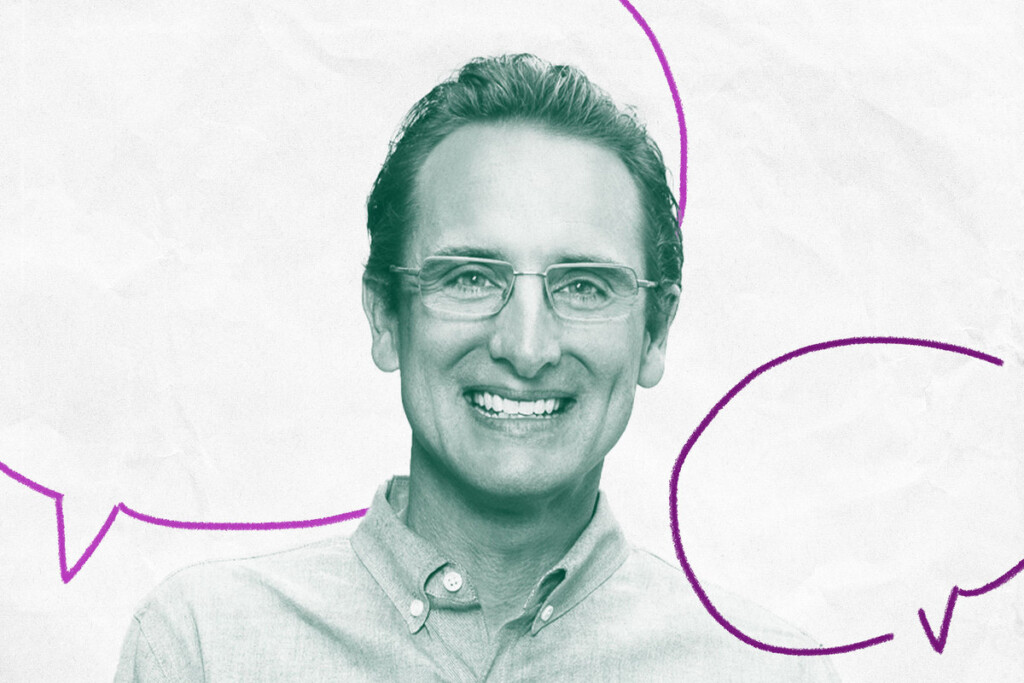Since taking the lead of Dallas-based Sixty Vines, Mexican Sugar, and Whiskey Cake under parent company FB Society, Jeff Carcara has led Sixty Vines through the pandemic and into new partnerships with brands such as California-based Ridge Vineyards. In early June, the brand also launched a new sparkling wine brand, Sesenta Cava—named for the number 60 in Spanish, and Carcara has also doubled the brand’s footprint since 2021, growing from three to seven restaurants across Texas. He says he has plans to open three more of the wine- and sustainability-focused concept this year. “We’re creating a whole new way of doing business in the wine world,” Carcara says.
Carcara took on his role in May 2020, shortly before the brand’s parent company, Front Burner Restaurants, rebranded to its new moniker FB Society. FB Society, which is led by CEO Jack Gibbons and chairman Randy DeWitt (who is also the Legacy Hall founder), has a portfolio that includes Velvet Taco, Uptown concept Haywire, Southern chain Ida Claire, The Ranch at Las Colinas, and Son of a Butcher Slider Bar, as well as the three brands Carcara oversees.
As we settled into a high top table at Sixty Vines near the Crescent in Uptown, Carcara shared details around his ascent through the restaurant industry; how Sixty Vines’ renowned wine kegs work; the brand’s other sustainability secrets; and more.
D CEO: What has your journey in the restaurant industry looked like?
Carcara: “I was born into the business: My uncles, my dad, my grandfathers—everybody from Chicago to Florida has owned restaurants. I come from an Italian family. One of my grandfathers had a butcher shop and a little café attached to it. My other grandfather had a restaurant in Chicago, which was an institution for 40 years in the city before he retired and closed it. My uncles started Italian restaurants in Orlando for about 15 to 20 years, and my dad also got involved with them later in life. That’s where, as a 12 year old, I was peeling garlic, bussing tables, and all that stuff. So, the bug was put in me pretty early. I’m in the business because of that.
“I graduated from the University of Central Florida, which is now the largest hospitality school in the nation. I went right to work for Hillstone Restaurants, which was Houston’s back in the day. I spent about 10 years there then left. I did a stint with Darden Restaurants and was there about 14 years. I helped them grow two concepts: first, Bahama Breeze then Seasons 52. I was working with their president in new business for quite a while, helping them grow concepts. Then, I was recruited by Del Frisco’s Restaurants. At the time they were in Southlake. They’d just gone public, and I came on as their chief operating officer to spur growth. They had three brands at the time: Sullivan’s Steakhouse, Del Frisco’s Grille, and Eagle Steak House.
“From there, I was recruited away by private equity to run a company out of Connecticut called Bar Taco Restaurant Group. They’re the owners of Barcelona Wine Bar and Bar Taco. I spent four years there, growing and developing that company, and we sold it to none other than Del Frisco’s Restaurant Group. We moved back to Dallas to help the integration and transition of the two companies come together. I did that for about three months and then took a break, and that’s when I ran into Jack [Gibbons] and Randy [Dewitt] and got a call saying, ‘Hey, we’re looking for somebody to come grow and develop the brands.'”
D CEO: What have been some recent major milestones for the brands you lead?
Carcara: “During the pandemic, as we were closing, it gave me an opportunity to reassess the brands and look at where they were, and it gave us an opportunity to better them in a way and come out stronger. Coming out of the pandemic, at Sixty Vines, we changed the service platform. We changed how we source: We changed priorities in sourcing from just taking what we can get to saying, ‘No, we’re creating a platform. We’re creating a whole new way of doing business in the wine world.’ We want people that want to partner with us. We want people that believe in what we’re doing. We’re not just doing it to make wine a little less expensive, so they can make profit. We want people who understand that kegging is also part of their sustainability program, and we’ve found them.
“We were literally in Napa in late 2020, knocking on doors and the people that would answer were like ‘God, we can’t believe your here! Great! Let’s sit down.’ We had great conversations, and some of those doors we knocked on are great partners today. Also, we went from three restaurants to seven today. We’ve opened four since 2021, and this year we’ll have three more openings. So, we’ll be at ten locations.”
D CEO: How do your namesake 60 kegs of wine work and promote sustainability?
Carcara: “The beauty of it is there’s no air involved in it whatsoever, and there’s no light. It’s a sealed stainless steel, which does not leach any flavor. The sustainability piece is 26 bottles [per keg] and are not going into landfill. So that’s 26 times four to five glasses in a bottle, where the last glass is as good as the first. So, if that keg is poured in two or three days completely to the bottom, or we’ve tested kegs over a year—the quality has remained the same. We tested with winemakers because they wanted to know. Now, we don’t have anything that lasts probably more than 90 to at most 120 days, because everything is moving pretty quickly.
“The other part of it is temperature. This was a big one for me, because when I go to restaurants and I get a glass of red wine and it’s hot, it’s such a letdown. Our kegs are sitting at cellar temperature. It’s always gonna come out at the right cellar temperature. So, that’s one of the other intended consequences. It’s really the best way to drink wine.”
D CEO: How else does Sixty Vines address sustainability?
Carcara: “When Randy DeWitt brought me on, he gave me the goal of making the first one a small amount of carbon neutral restaurants in the world. It is a hard undertaking, and I’m not going to say we’re going to get there tomorrow. I’m not going to even put a date on it. We’re just slowly chipping away at things, the sustainable piece of things spoke to me because I’m someone that loves to challenge status quo. I’m in this business to change it in some way, shape, or form, and part of that change needs to be sustainability. We need to be better shepherds in the restaurant business as a whole. I can tell you growing up in the business and seeing some of the crazy chemicals we’ve used over the years and just some of the stuff that operators do, we can do a better job, and I feel good that we’re starting to do a better job. What we’re doing at Sixty Vines is leaching into the other brands too for us. So, when we start something here and it works, and it’s sustainable sustainability, we do pass it forward.
“We do it in a lot of little ways right now. We have glass candles on the tables every night. They’re recycled. Someone comes in a couple times a week, picks them up, refills them with soy wax, and they’re burned. So it’s a sustainable process. Candles can be a huge waste, especially if you’re buying votives and throwing those votives in the trash. We also created a [bubbly] brand called Sesenta Cava. It has no foil. The label is recycled paper. For every bottle that’s sold, there’s a carbon offset. In every bottle, we’re committing to upcycling and recycling. Our menus are made from 100 percent recycled paper, and the paper is made with wind power. Any extra menus, we cut them up and use them in different ways. All of our to-go packaging is made from biodegradable recycled materials. Every cork we save and we ship it to an artisan who makes goods from it. On our website, we have a Shop 60 website, where you’ll find mugs that have a cork bottom, or a cork backpack, or luggage tags, a journal that’s made from cork, and all that stuff.
“We are about to test a composter in our Nashville location that food waste will go into. One of our biggest opportunities for us right now is if we can stop our food waste. If we can stop that from going into the trash and into the landfills, we will probably take 40 to 60 percent of our footprint. We probably would make a jump to 40 percent carbon neutrality. So that’s one of the biggest goals we’re working towards. That’s probably going to be the longest goal to achieve.”
D CEO: What trends are you seeing in the wine industry?
Carcara: “People are willing to try different stuff, so we don’t want to continue to just have the same old chardonnay, cabernet, or merlot. People are starting to ask about more merlot, and that excites me because I think merlot got a really bad rap from a dumb movie. The most expensive wine in the world, Chateau Petrus, is merlot. People forget about that. It’s an incredible grape that creates incredible wine. I’m so happy to see people start asking and we’re selling it. When I started, I don’t even know if we had a merlot on tap. Now, we have three.
“In some of our other restaurants, we’re seeing a little bit of that nonalcoholic trend. It’s out there, but I don’t like to say it’s even a relevant piece of the business. People are asking, and I think that’s probably because they are reading about it more than they really want it, especially in Texas, because people still enjoy a good drink. Beer is dying. Craft beer is dying faster. It’s a shame. Beer is less than 1 percent of our sales in this brand. In the other two brands, it’s in the very low single digits. We’ve been slowly pulling more and more taps and converting them either to cocktails or wine.”
D CEO: Looking into the future, what are your growth goals?
Carcara: “We are expanding Sixty Vines. Of the brands [I oversee], it is the number one brand we’re focusing on to expand. We’re doing about four locations a year. We have four slated each year for 2024, 2025, and 2026 right now. We are working on a couple of loose ends in 2026, but we’ll continue to try and do four a year. Right now, we will be growing in the D.C., Virginia market and backfilling in Florida and a little bit of Texas. We do have a one-off location opening in Charlotte, North Carolina, in August of this year. We have another coming in Nashville in the suburbs of Franklin in 2025 or 2026. We have that site. We’ll have one in D.C. around the first of next year. We’ll have a second location in Orlando around the first of next year. We’ll have a Miami location signed, and we have domain in Austin signed.”
Author




